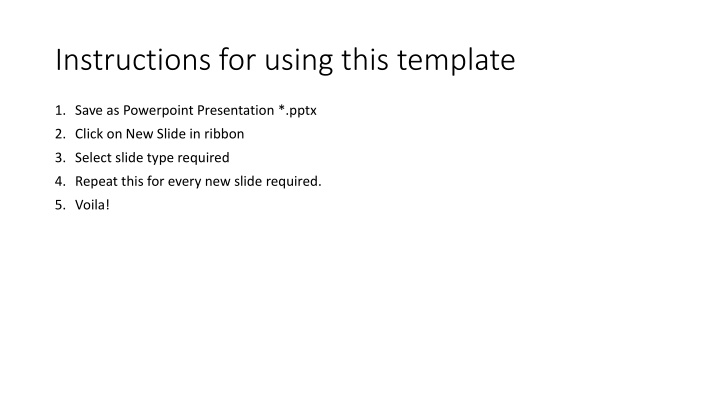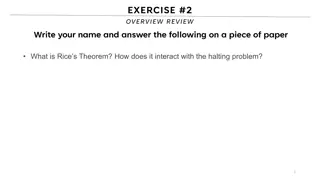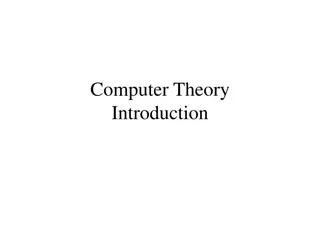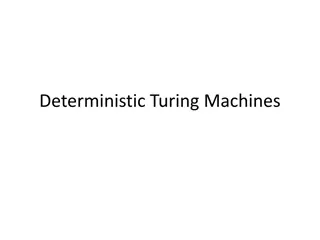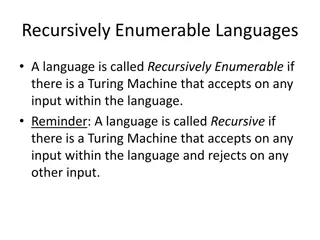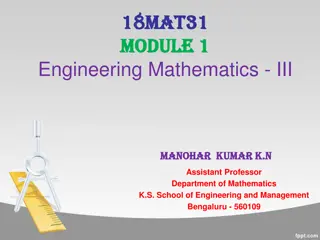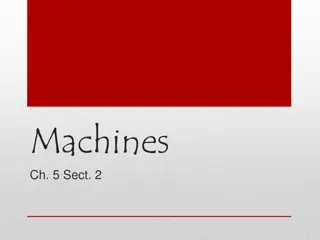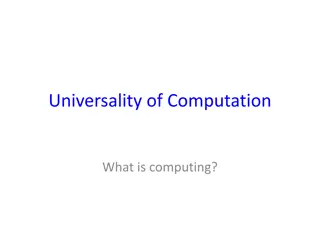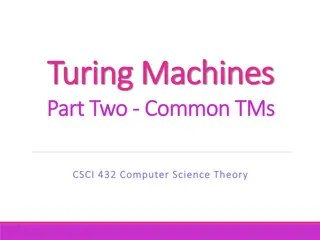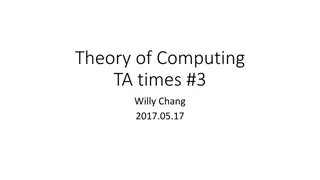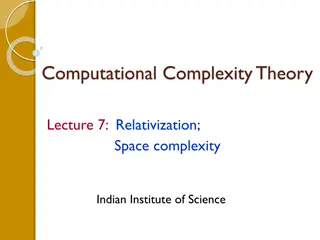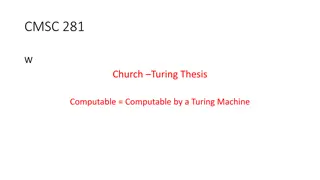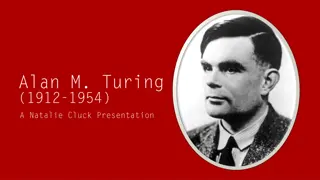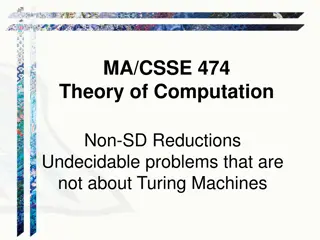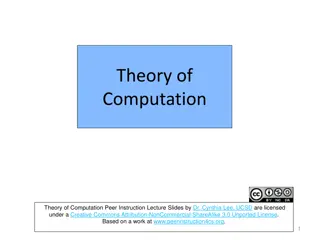Introduction to Turing Machines and Computability
Alan Turing, a mathematician known for his groundbreaking work in statistics and code-breaking, developed the first formal definition of computation. He introduced the notion of computability by addressing the Entscheidungsproblem, which questioned the decidability of mathematical statements. Turing formulated the abstract concept of a computing machine known as the Turing Machine, consisting of a tape, scanning head, symbols, and rules governing its actions. This lecture covers the Turing Test and finite-state methods, setting the stage for exploring computational morphology.
Download Presentation

Please find below an Image/Link to download the presentation.
The content on the website is provided AS IS for your information and personal use only. It may not be sold, licensed, or shared on other websites without obtaining consent from the author.If you encounter any issues during the download, it is possible that the publisher has removed the file from their server.
You are allowed to download the files provided on this website for personal or commercial use, subject to the condition that they are used lawfully. All files are the property of their respective owners.
The content on the website is provided AS IS for your information and personal use only. It may not be sold, licensed, or shared on other websites without obtaining consent from the author.
E N D
Presentation Transcript
Instructions for using this template 1. Save as Powerpoint Presentation *.pptx 2. Click on New Slide in ribbon 3. Select slide type required 4. Repeat this for every new slide required. 5. Voila!
Academic Writing Academic Writing John Shanahan Academic Skills Adviser
Session Aims To help you understand what academic writing is and what it is for. To discuss the importance of structure in academic writing To discuss some types of academic writing you may come across in your first year. To allay some of your fears about returning to learning. #UoEStudyZone exeter.ac.uk/studyzone studyzone@exeter.ac.uk
What does Academic Writing look like? Structured Contains an argument or thesis based on a series of logically progressing ideas Adopts a formal or professional tone, and uses technical language specific to a subject Evidence based and objective Supported by good referencing skills #UoEStudyZone exeter.ac.uk/studyzone studyzone@exeter.ac.uk
What is Academic Writing for? one of the main forms of communicating ideas and research within your discipline through it you demonstrate your understanding of your subject you demonstrate the depth and quality of the research you have undertaken you demonstrate your ability to draw together (synthesize) information and evidence from a wide variety of sources, evaluate it and use it to form an original argument or point of view to put forward a persuasive, evidence based argument that acknowledges (references) the sources of your evidence #UoEStudyZone exeter.ac.uk/studyzone studyzone@exeter.ac.uk
Types of academic writing Note that the types of writing will vary with your discipline or subject this is not an exhaustive list: Essays Reports Reflective writing assignments Reviewing and critiquing a journal article / paper #UoEStudyZone exeter.ac.uk/studyzone studyzone@exeter.ac.uk
An Essay Is a an extended piece of writing (usually between 1,000 and 5,000 words). Aims to respond or discuss a specific question. Has an introduction and conclusion, and uses good paragraphing in the main body to build your argument or thesis. #UoEStudyZone exeter.ac.uk/studyzone studyzone@exeter.ac.uk
A Report Will also vary in length. Also aims to answer a question or solve a problem. Tends to have a more formal structure with specific sections and headings. Often involves gathering and evaluating information, data, or materials which underpin the report. #UoEStudyZone exeter.ac.uk/studyzone studyzone@exeter.ac.uk
A Reflective Essay Usually requires you to reflect on, or review, a specific process, project or placement which you have undertaken. Requires you to discuss what happened, but also suggest why things happened, what factors influenced this and how things might have been done differently. You may be given a particular model or structured questions to help you reflect more deeply. #UoEStudyZone exeter.ac.uk/studyzone studyzone@exeter.ac.uk
Reviewing or Critiquing a Journal Article or Paper You may be asked to read a piece of research and discuss the key findings. What might the strengths and weaknesses be of the research and the ideas presented? What impact might the findings or ideas have? #UoEStudyZone exeter.ac.uk/studyzone studyzone@exeter.ac.uk
Structure in Academic Writing Whatever the form of the piece of writing, you will need to approach it in a structured, methodical way. However, whilst there are key features that need to be included, and some elements of writing happen at particular points, there isn t necessarily a right or wrong way of going about things, try ordering the following steps: (See attached Word doc) #UoEStudyZone exeter.ac.uk/studyzone studyzone@exeter.ac.uk
General Guidance Ensure you understand what the assignment is asking you to do. Check carefully any guidance you have been given about the style and structure of the assignment. All academic writing will require you to do your own reading and include reference to this in your assignment. You will be expected to include some critical analysis in your writing (more advice will be given about what this means as you start your course). Critical analysis is about taking a questioning approach to issues, comparing different viewpoints, using evidence to support what you are saying, thinking deeply about what things mean and the impact they might have. Do ask questions and ask for advice. #UoEStudyZone exeter.ac.uk/studyzone studyzone@exeter.ac.uk
Any Questions? #UoEStudyZone exeter.ac.uk/studyzone studyzone@exeter.ac.uk
Ongoing Support 1:1 appointments Writing Caf (Tuesday and Thursday 1:00-3:00. Workshops Digital Resources https://universityofexeteruk.sharepoint.com/sites/StudyZone #UoEStudyZone exeter.ac.uk/studyzone studyzone@exeter.ac.uk
